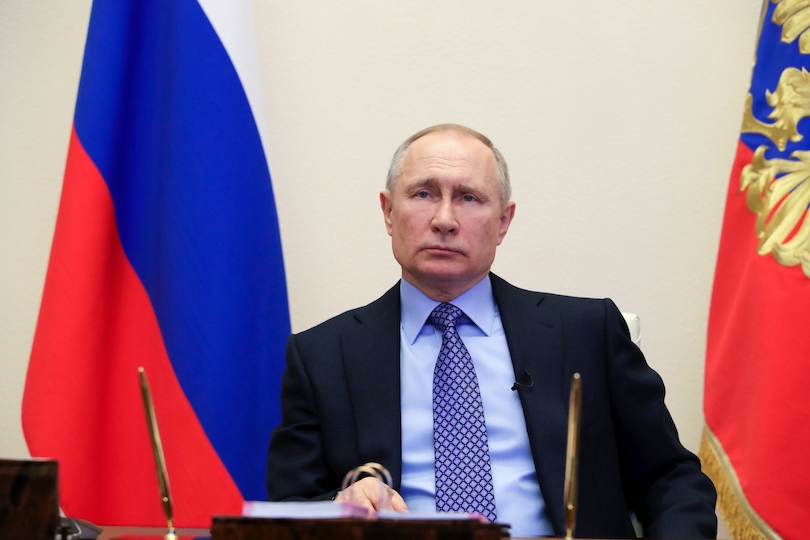[ad_1]
When Russia invaded Ukraine in February 2022 it was not through the use of irregular or hybrid tactics – but through conventional military means. Many scholars and policy analysts failed to see this coming, and ultimately, the voices of “hysteria” predicting an all-out invasion proved to be correct. Some of these voices had access to intelligence and made an assessment based on observations. But assertions of “intel” seemed highly abstract to the general population due to the inability of the intelligence community to share specific information or sources. Others among those foreseeing an “imminent invasion” simply had the advantage of having a black and white mindset about who Vladimir Putin is, understanding him to be a bloodless killer, oppressive dictator, destroyer of the liberal order and paranoid former KGB officer whose ultimate goal has always been to restore the Russian Empire or Soviet Union through any means necessary. The reality is far less black and white, which helps to explain why many in the academic and policy communities were left in shock when Putin finally pulled the trigger, so to speak.
Putin’s latest actions in Ukraine are deplorable, inexcusable, unprovoked, and worthy of global condemnation. And the manner through which he is conducting this war reveals much about his lack of regard for human dignity. Nevertheless, it is important to try to understand all the factors at play in this situation to gain a more comprehensive understanding of great power competition, civilizational nationalism and identity, and Putin’s ambitions with Ukraine and beyond. War never occurs in a vacuum and is more often the result of the culmination of grievances and distrust. Realism in International Relations can help predict when nations will react to threat, but the use of non-material theories can further help elucidate the intricacies and nuances of individual nations, leaders and their choices to launch incredibly costly wars. Putin didn’t just flip a switch and become insane – he actually believes there are legitimate reasons for this war. Just as other leaders believed there were legitimate reasons for wars they launched in the past and just as leaders will continue to do so in the future. Having a better understanding of what motivates leaders and nations is an area that should incite much more attention in order to understand and prevent future wars in this era characterized by growing multipolarity and conflicting interests and values.
In November 2021, Russia amassed a significant number of troops near its border with Ukraine. Prior to the November movement of troops, other events unfolded including Turkey’s sending of lethal drones to Ukraine which were used to destroy the artillery of pro-Russian separatists, and large-scale naval exercises in the Black Sea led by the US, UK and Ukraine. For years Putin has vocalized how actions such as these as well as the continued substantial military aid to Ukraine and its eventual accession into NATO are a threat to Russia’s security. International legal norms and agreements on the European security architecture posit that every nation has the right to choose any alliance they wish to join and that “spheres of influence” are not acceptable in the post-Cold War international order. Though Russia acknowledges this, it has repeatedly argued that according to Article 10 of the NATO Founding Treaty, NATO “may” then accept said nation if it is in the interest of all member states. Russia has also argued that according to the Charter for European Security, each state is free to choose its alliance so long as it does not strengthen its security at the expense of another state. In other words, Russia and the West accuse each other of not respecting the principle of “indivisible security.” The 130,000 troops placed near Ukraine’s borders were said to have been placed there for the purpose of military drills and exercises. At this moment in time, two distinctive camps formed on Putin’s intentions. The first camp believed the Russians were preparing for an invasion of Ukraine. The other camp believed this was a provocation tactic to get the West to the negotiating table on Russia’s long-lamented security concerns about NATO’s continued enlargement to the East and perhaps start negotiations for a “Helsinki 2.0.” Essentially, both these camps were correct at one point in time. The troops were placed there first and foremost to negotiate security concerns at the barrel of a gun – but when that didn’t work out, Putin invaded Ukraine with what seems like a plan to topple the government and install a puppet regime.
At first, negotiations seemed to be headed in a positive direction as high-level meetings took place weekly on important security-related concerns. However, Putin’s demands for guarantees that Ukraine would never join NATO and for returning NATO infrastructure to the 1997 lines were non-starters for the West. Once this became clear, Putin appeared to be reluctant to negotiate secondary security concerns that the West proposed such as arms control agreements. This is where many went wrong. Perhaps if the country in question were not Ukraine, Putin would have settled for a suboptimal result and secondary agreements. But because of the significance of Ukraine for Putin and for Russia, he did not behave the same way with Ukraine as he has been with other nations in the post-Soviet space. This highlights the importance of “affective” or ideational motivational factors when making a cost-benefit analysis, a factor many ruled out as being an “irrational” motivation for invading and thus failed to consider it. Usually, Putin settles for something similar to the maintenance of a frozen conflict on his neighbor’s territory to ensure their inability to join NATO, carefully considering a material cost-benefit analysis on how to approach security threats in the near abroad. But since 2014, Ukraine has been a strong partner of the West, has begun creating military interoperability with NATO, engages regularly in trainings with Western partners, regularly receives weapons capabilities, and has understandably become increasingly anti-Russian. Given Ukraine’s geographical position between Russia and the West, its size, strategic importance, and “affective” significance for the Russian civilization, Putin could not accept continuing to let this happen. Putin calculated that the only way to achieve the de-militarization of Ukraine, ensure its neutrality, and force its return to the “Russian World” was to invade and implement a pro-Russian government.
The idea of the “Russian World,” or Russkiy Mir, is an imagined Russian community made up of the peoples of Russia, Belarus and Ukraine and to a lesser extent Russian-speakers and Russian enclaves in the near abroad. This imagined community is based on centuries of history that have helped shape what Russia believes is part of its civilization identity. For Putin and the governing elite in Russia, this notion of a “Russian World” made its first appearance in the 1990s and has been placed at the forefront of many of today’s discussions. The concept is used to justify the protective role of Russia towards Russians in the near abroad. It juxtaposes itself sharply with the West and is a form of civilizational nationalism. Russian enclaves in the near abroad are located in places such as the Donbas, Transnistria, and Crimea as well as in the Baltics. The Russian Orthodox Church has played a significant role in the idea of the Russkiy Mir and has dispensed these ideas abroad working closely with the Russian government focusing on the “sacred” East Slavic Orthodox community of Russians, Ukrainians, and Belarusians. In other words, losing Ukraine to the West was simply not an option for Putin, even if it meant having to occupy Ukraine for the rest of time.
Analysts who got it wrong assumed Putin’s future actions would resemble his past actions and overall tendencies. It seemed out of character to resort to full-on war. Putin’s actions in the past have always been characterized by a measured intensity, a calculated risk, limited incursions to achieve just the right amount of leverage somewhere. Russia didn’t invade all of Georgia after pushing back the Georgian army when it attempted to re-integrate the breakaway regions of Abkhazia and South Ossetia (although it clearly could have judging by the rapidity with which it won that war). Instead, Russia defended these regions and recognized their independence, and then adopted a rather “laissez-faire” attitude after some initial attempts with political and economic coercion towards Georgia.
Georgia is now a NATO aspirant, a Deep and Comprehensive Free Trade Area (DCFTA) signatory and an EU aspirant and Putin has never attempted to initiate a false flag operation in Abkhazia or South Ossetia as a pretext to invade Georgia and install a new regime. It was enough for Russia to ensure Georgia would never join NATO by merely recognizing those breakaway regions and retaining a Russian presence there. This demonstrates measured action to achieve limited but essential goals and settling for a suboptimal result (optimal being Georgia remaining under Russia’s orbit both militarily and economically). In addition, Russia never opted to invade neighboring Moldova either, who is also a DCFTA signatory and an EU aspirant. However, it remains militarily neutral and has a frozen conflict on its territory in Transnistria where Russia maintains a troop presence. Though suboptimal, Putin did not attempt any false flag operations there either as a pretext for invasion and has settled with the neutrality of Moldova and a semi-Russian friendly government.
Armenia is a Russian ally and part of the Eurasian Economic Union; Azerbaijan is non-aligned, has no significant cooperation with NATO or the Collective Security Treaty Organization (CSTO) and does not participate in any economic bloc; Belarus is a Russian ally and part of the EAEU; Kazakhstan is a Russian ally and an EAEU member; Kyrgyzstan is a Russian ally and EAEU member; Tajikistan is a Russian ally but nonparticipant in any economic bloc; Turkmenistan is neutral and is nonparticipant in any economic bloc; and Uzbekistan is nonaligned, left the CSTO in 2012 and is nonparticipant in any economic bloc. Russia and neutral Finland have also had a cooperative relationship. If Putin were trying to restore the Russian Empire or Soviet Union, as many argue he is doing today based on his invasion of Ukraine, he would have applied more interventionist tactics throughout all of post-Soviet space or post-Empire space. Instead, Putin is comfortable holding his neighbors at “arms’ length.”
Russia and Ukraine had been involved in a simmering war for the past eight years, a war that was in the making much earlier than that. One may ask the obvious question of ‘why now?’ Why did Putin invade now and not eight years ago? Or five years ago? Or two years ago? Since the initial fighting began in 2014–2015, Russia and Ukraine with the help of France and Germany have attempted to implement the Minsk Agreement. This agreement, had it been respected by both sides, was an agreed upon solution to end the war. As well as ensuring a withdrawal of any Russian troops, the agreement would have reunified Ukraine (minus Crimea) by granting a type of autonomy for the Donbas – a compromise solution for the independence status this region sought in 2014 after the breakout of the Maidan Revolution. Considering the current alternative, the implementation of the Minsk Agreement would have been the best case scenario. While it was originally signed by all parties, Ukraine began to think that this agreement would ultimately be giving up its sovereignty by allowing Russia to have a say in the political decision-making inside Ukraine due to its leverage over the Donbas. But a significant Russian minority live there and would have appreciated a more representative government – an essential characteristic of any true democracy. This issue, among many ceasefire violations, disagreements on the sequence of actions, and an inadequate Russian withdrawal ultimately led the negotiation process to stall and appear hopeless.
Another important turn of events that may have emboldened Putin to act now is Belarussian President Alexander Lukashenko’s international condemnation after his orchestration of fraudulent elections in Belarus in 2020 – which in essence made Putin his lifeline. Putin now has a much stronger grip on Lukashenko to help him hold on to power in a society that no longer believes he is the legitimately elected leader. The two countries have engaged in significant military exercises since the establishment of their closer ties. Russia placed troops on Belarus’ border with Ukraine and used that location as one of its angles from which to launch the 2022 invasion. Perhaps with more leverage over Belarus, the idea of the Union State established in 1999 between Belarus and Russia with the stated goal of deepening their relationship through integration in economic and defense policy could be revived – and this is thought to be the time to force Ukraine to integrate as well and reunite the “Russian World.”
Ultimately, the fact that Putin went through with the invasion means several things. One, that Putin did not think Minsk would ever be implemented as the government in Kyiv grew understandably more anti-Russian by the day. Two, that Putin did not think Ukraine would ever declare itself neutral again unless it was done by force. Three, that invading Ukraine was worth the risk of a decades-long insurgency and total condemnation from the West turning Russia into a pariah state. And four, that this would be the right time to unite the “Russian World.”
Putin’s actions are not justified – but this war could have been avoided not just by his choices but the choices made leading up to this conflict. Many would argue that negotiating with Putin would have empowered him to continue behaving as a spoiler state. Well now the alternative has presented itself and there is a war on the European continent where Ukrainians are dying and forced to flee their homes and the West cannot even intervene and help. This war could escalate into a nuclear confrontation between NATO and Russia in the event of escalation and miscalculation, which would spell disaster for the entire world. While Putin’s recent diplomacy at the barrel of a gun was unacceptable, if refusing to take into consideration Russia’s long-vocalized security concerns in order to defend Ukraine’s possibility of joining the alliance one day (even though the alliance clearly stated Ukraine was currently ineligible to join) was more important than reaching a fair but suboptimal solution for the greater good of the European security order, it should be pointed out that Ukrainians are the victims of that decision.
Despite many not wanting to admit it, this is no longer a unipolar world – other great powers exist in the system and have a different set of interests than the US and its allies. This issue cannot be solved by pretending it doesn’t exist. In other words, figuring out how to co-exist in a multipolar world order with rising autocratic powers should be the current goal of this day and age. Attempting to analyze Putin through Realism in International Relations works up to a certain point. But Realism fails to predict non-material motivational factors in a leader or country’s decision-making and risk calculus as well as just how far a leader is willing to go in the pursuit of his or her convictions. It also doesn’t calculate how merciless personal warfare style can be. According to Realist thought, war occurs because there is no central authority protecting states from one another. Nations exist in a state of anarchy which creates an environment of mistrust where they compete for power and may use force to make themselves more secure. As there is no way to know when a state will decide to use force, they hedge against each other assuming one will try to harm the other.
The US has made it very clear that there is no room for other great powers in the western hemisphere. During the Cold War, the Reagan Administration organized a coup to overthrown the Sandinistas in Nicaragua to resist Soviet and Communist power and influence near its borders. For similar reasons, when the world’s largest military alliance kept moving closer to Russia’s borders, a sense of insecurity was felt by the Russians. When Viktor Yanukovytch was ousted from power in Ukraine in 2014, US officials supported Ukrainian efforts to pick his successor, leading to the fear that this may be another western-supported “Color Revolution” right next to its borders. Putin reacted by ceasing Crimea (the strategic port of Sebastopol in the Black Sea) and backing Russian-speaking separatist movements in eastern Ukraine. Realism accurately predicts a great power will react to a threat, particularly around its borders, but doesn’t predict how far it will go, and doesn’t take into consideration how non-material motivators can factor into their risk calculus.
What Putin does next will be revelatory for the ongoing debates about his motivations. If Russia invades Odessa with the goal of occupying and recognizing neighboring Transnistria in Moldova, or attempts at instigating secessionist movements in other Russian enclaves in the Baltics and beyond, the arguments about Putin being an unstable imperialist will be given credence, as these actions would be based on purely ideational motivations. Here Realist arguments about security concerns could be undermined as Moldova is constitutionally neutral and poses no real threat to Russia. If Putin decides to launch a full-scale invasion of Georgia, this could still be argued as a typical Realist prediction of a state under threat due to Georgia’s NATO aspirations – but Putin has already reacted to that threat and probably wouldn’t react further due to the lack of ideational motivations towards Georgia. Both material and ideational factors need to be present to predict an “irrational” invasion with endless repercussions. Based on this assertion, unless miscalculations and escalations occur between Russia and NATO, Putin will most likely stop at Ukraine. In any case, Putin has acted in bad faith. Even if he does stop at Ukraine, neighboring states can no longer feel safe as a new Iron Curtain has been raised in Europe, only further East.
Hopefully when this new cold war finally ends decades from now, the victor will find a more constructive way to include the losing side in a more comprehensive security architecture in order to prevent “revanchism” from occurring which would lead to a Third Cold War in a never ending cycle.
Further Reading on E-International Relations
[ad_2]
Source link



















